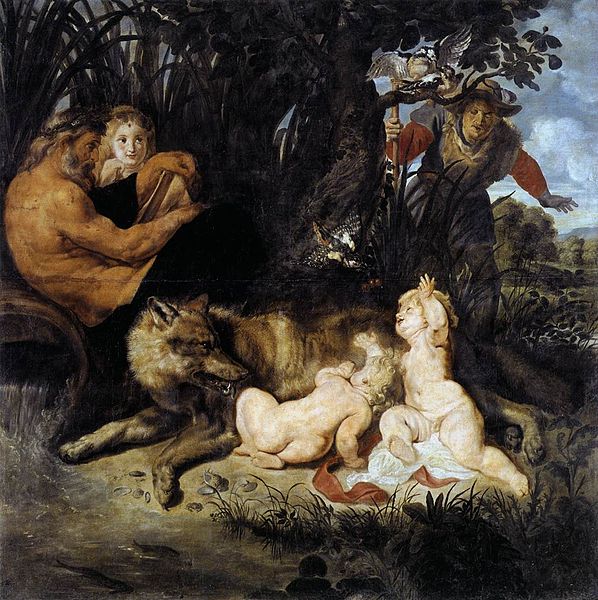
Καὶ ἐπειδὴ ὁ τῶν ἀρχαιρεσίων ἐνέστη χρόνος, καὶ ὁ κῆρυξ τὴν πρώτην τάξιν ἐκάλεσεν, εἰσελθόντες εἰς τὸν ἀποδειχθέντα τόπον οἵ τ’ ὀκτωκαίδεκα λόχοι τῶν ἱππέων καὶ οἱ τῶν πεζῶν ὀγδοήκοντα τῶν τὸ μέγιστον τίμημα ἐχόντων Λεύκιον Κοίντιον Κικιννᾶτον ἀποδεικνύουσιν ὕπατον, οὗ τὸν υἱὸν Καίσωνα Κοίντιον εἰς ἀγῶνα θανάτου καταστήσαντες οἱ δήμαρχοι τὴν πόλιν ἠνάγκασαν ἐκλιπεῖν· καὶ οὐδεμιᾶς ἔτι κληθείσης ἐπὶ τὴν ψηφοφορίαν τάξεως (τρισὶ γὰρ ἦσαν λόχοις πλείους οἱ διενέγκαντες τὴν ψῆφον λόχοι τῶν ὑπολειπομένων) ὁ μὲν δῆμος ἀπῄει συμφορὰν βαρεῖαν ἡγούμενος, ὅτι μισῶν αὐτοὺς ἀνὴρ ἐξουσίας ὑπατικῆς ἔσται κύριος, ἡ βουλὴ δὲ ἔπεμπε τοὺς παραληψομένους τὸν ὕπατον καὶ ἄξοντας ἐπὶ τὴν ἀρχήν. ἔτυχε δὲ τηνικαῦτα ὁ Κοίντιος ἄρουράν τινα ὑπεργαζόμενος εἰς σποράν, αὐτὸς ἀκολουθῶν τοῖς σχίζουσι τὴν νειὸν βοιδίοις ἀχίτων, περιζωμάτιον ἔχων καὶ ἐπὶ τῇ κεφαλῇ πῖλον. ἰδὼν δὲ πλῆθος ἀνθρώπων εἰς τὸ χωρίον εἰσιόντων τό τε ἄροτρον ἐπέσχε καὶ πολὺν ἠπόρει χρόνον, οἵτινές τε εἶεν καὶ τίνος δεόμενοι πρὸς αὐτὸν ἥκοιεν· ἔπειτα προσδραμόντος τινὸς καὶ κελεύσαντος κοσμιώτερον ἑαυτὸν ποιῆσαι παρελθὼν εἰς τὴν καλύβη καὶ ἀμφιεσάμενος προῆλθεν. οἱ δ’ ἐπὶ τὴν παράληψιν αὐτοῦ παρόντες ἠσπάσαντό τε ἅπαντες οὐκ ἐκ τοῦ ὀνόματος, ἀλλ’ ὕπατον καὶ τὴν περιπόρφυρον ἐσθῆτα περιέθεσαν τούς τε πελέκεις καὶ τἆλλα παράσημα τῆς ἀρχῆς παραστήσαντες ἀκολουθεῖν εἰς τὴν πόλιν ἠξίουν. κἀκεῖνος μικρὸν ἐπισχὼν καὶ δακρύσας τοσοῦτον εἶπεν· “ἄσπορον ἄρα μοι τὸ χωρίον ἔσται τοῦτον τὸν ἐνιαυτόν, καὶ κινδυνεύσομεν οὐχ ἕξειν, πόθεν διατραφῶμεν.” ἔπειτ’ ἀσπασάμενος τὴν γυναῖκα καὶ τῶν ἔνδον ἐπιμελεῖσθαι παραγγείλας ᾤχετο εἰς τὴν πόλιν. ταῦτα δὲ οὐχ ἑτέρου τινὸς χάριν εἰπεῖν προήχθην, ἀλλ’ ἵνα φανερὸν γένηται πᾶσιν, οἷοι τότε ἦσαν οἱ τῆς Ῥωμαίων πόλεως προεστηκότες, ὡς αὐτουργοὶ καὶ σώφρονες καὶ πενίαν δικαίαν οὐ βαρυνόμενοι καὶ βασιλικὰς οὐ διώκοντες ἐξουσίας, ἀλλὰ καὶ διδομένας ἀναινόμενοι· φανήσονται γὰρ οὐδὲ κατὰ μικρὸν ἐοικότες ἐκείνοις οἱ νῦν, ἀλλὰ τἀναντία πάντα ἐπιτηδεύοντες, πλὴν πάνυ ὀλίγων, δι’ οὓς ἕστηκεν ἔτι τὸ τῆς πόλεως ἀξίωμα καὶ τὸ σώζειν τὴν πρὸς ἐκείνους τοὺς ἄνδρας ὁμοιότητα. ἀλλὰ περὶ μὲν τούτων ἅλις.
(Dionysius of Halicarnassus, Rhōmaikē Archaiologia 10.17.3-6)
And when the day appointed for the election had come and the herald had called the first class, the eighteen centuries of knights together with the eighty centuries of foot, consisting of the wealthiest citizens, entering the appointed place, chose as consul L. Quinctius Cincinnatus, whose son Caeso Quinctius the tribunes had brought to trial for his life and compelled to leave the city. And no other class being called to vote—for the centuries which had voted were three more in be than the remaining centuries—the populace departed, regarding it as a grievous misfortune that a man who hated them was to be possessed of the consular power. Meanwhile the senate sent men to invite the consul and to conduct him to the city to assume his magistracy. It chanced that Quinctius was just then plowing a piece of land for sowing, he himself following the gaunt oxen that were breaking up the fallow; he had no tunic on, wore a small loin-cloth and had a cap upon his head. Upon seeing a crowd of people come into the field he stopped his plough and for a long time was at a loss to know who they were or what they wanted of him; then, when some one ran up to him and bade him make himself more presentable, he went into the cottage and after putting on his clothes came out to them. Thereupon the men who were sent to escort him all greeted him, not by his name, but as consul; and clothing him with the purple-bordered robe and placing before him the axes and the other insignia of his magistracy, they asked him to follow them to the city. And he, pausing for a moment and shedding tears, said only this: “So my field will go unsown this year, and we shall be indicate danger of having not enough to live on.” Then he kissed his wife, and charging her to take care of things at home, went to the city. I am led to relate these particulars for no other reason than to let all the world see what kind of men the leaders of Rome were at that time, that they worked with their own hands, led frugal lives, did not chafe under honorable poverty, and, far from aiming at positions of royal power, actually refused them when offered. For it will be seen that the Romans of to‑day do not bear the least resemblance to them, but follow the very opposite practices in everything—with the exception of a very few by whom the dignity of the commonwealth is still maintained and a resemblance to those men preserved. But enough on this subject. (tr. Earnest Cary)








